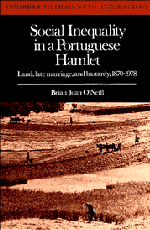Book contents
- Frontmatter
- Contents
- List of tables
- List of figures
- List of illustrations
- List of plates
- Acknowledgements
- 1 An ‘egalitarian’ Iberian community?
- 2 Open fields and communal land
- 3 Social groups
- 4 Cooperative labour
- 5 Matrimony and patrimony
- 6 Minimal marriage
- 7 The fulcrum of inheritance
- 8 Conclusion
- Appendix I The landholding survey
- Appendix II Social groups in 1851 and 1892
- Appendix III The Parish Register
- Appendix IV Household structure, 1977
- Appendix V Baptisms of bastards, 1870–1978
- Glossary of Portuguese terms
- Bibliography
- Index
- Cambridge Studies in Social Anthropology
1 - An ‘egalitarian’ Iberian community?
Published online by Cambridge University Press: 11 October 2009
- Frontmatter
- Contents
- List of tables
- List of figures
- List of illustrations
- List of plates
- Acknowledgements
- 1 An ‘egalitarian’ Iberian community?
- 2 Open fields and communal land
- 3 Social groups
- 4 Cooperative labour
- 5 Matrimony and patrimony
- 6 Minimal marriage
- 7 The fulcrum of inheritance
- 8 Conclusion
- Appendix I The landholding survey
- Appendix II Social groups in 1851 and 1892
- Appendix III The Parish Register
- Appendix IV Household structure, 1977
- Appendix V Baptisms of bastards, 1870–1978
- Glossary of Portuguese terms
- Bibliography
- Index
- Cambridge Studies in Social Anthropology
Summary
The problem
This thesis is about internal social distinctions within a Portuguese mountain hamlet. The principal argument is a simple one. I dispute the contention that small, isolated mountain communities in Northern Portugal are necessarily egalitarian in social structure. This has indeed been the image created by the major ethnographers working in the region over the past two decades. The inhabitants of such highland villages have everywhere convinced anthropologists that ‘we are all equal here’ (Davis 1977:71). I also selected a small mountain settlement as my object of study, but have arrived at entirely different conclusions. The epithet ‘egalitarian’ in this case is totally misleading, and hamlet life is ridden with inequality, internal conflict, and struggles to maintain positions of high economic and social rank.
Despite villagers' initial glosses about their relative equality within the hamlet, distinct social and economic differences emerged from my analysis. My research focused upon three major areas of social life: land tenure, cooperative labour, and forms of marriage and inheritance. Firstly, land is not owned in equal amounts and there is nothing at all egalitarian about its distribution within the community. Secondly, forms of cooperative labour contain conspicuous imbalances in the exchange of labour and time. Thirdly, marriage and inheritance practices reveal fundamental disparities between a few favoured heirs and their excluded siblings: while in ideal legal terms all heirs and heiresses inherit equally, this rarely occurs in practice. Rather than comprising a homogeneous group of peasant farmers, a clear hierarchy of four distinct social groups emerged: radical differences in economic standing, social status, and household structure separate the wealthy, the middling, and the poor.
- Type
- Chapter
- Information
- Social Inequality in a Portuguese HamletLand, Late Marriage, and Bastardy, 1870–1978, pp. 1 - 22Publisher: Cambridge University PressPrint publication year: 1987



